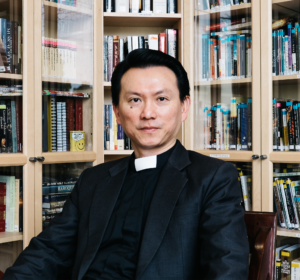The kingdom of God, which will be fully perfected at the second coming of Jesus, is already here but not yet. This chapter aptly illustrates the current state of the kingdom of God and the different types of people living in it.
In verse 9-15, and 40-43, we can observe conflict and disarray between the northern people of Israel and the southern people of Judah. After the death of Absalom, David returns to Jerusalem to claim back his throne but finds that his people are divided. He still remained in exile although he was victorious since there was still some hesitation among the people of Judah in bringing David back. Although they were initially part of David’s tribe, many of them supported Absalom in his rebellion and had to be convinced that no harm would be done to them before they finally accepted David back as their ruler. In verses 40-43, when David returned to Jerusalem, the people of Israel complained to the people of Judah, questioning why David was brought back to Jerusalem. The people of Israel wanted David for themselves and accused the people of Judah of stealing the king. David had already won, Absalom was dead, yet there was still conflict in the kingdom of David.
There are two things we can learn from this section regarding the kingdom of God in this age. First, we must accept the reality of life as we wait for the kingdom of God to arrive perfectly and fully in this world. We live in a world that is full of suffering and division, where “weed and wheat” are mixed together, even in the church. We are still in the stage of progressive sanctification. When facing conflict, it is important for us to have patience and pray for wisdom and strength from God, and have a teachable heart. Second, God will not leave His kingdom, a truth that should provide us with a sure hope. Take the Church of Corinth as an example, a church with many conflicts, sins, and divisions. Amidst all their struggles and difficulties, Paul never told them to disband. As a church of God, God will continually give us grace to grow until Christ comes again and we are made complete.
God has come and given us a new life, but that new life has not yet been fully manifested in our current life. Until Christ comes again, there will be sin and tears. Only when Christ comes again will sin be destroyed and tears be wiped away.
Verse 6-39 shows us three different characters representing three different types of people in the kingdom of God.
Shimei (v.15-23). Shimei was a man who cursed and threw stones at David and his men (2 Sam 16). When David claimed back his reign, Shimei quickly went to meet the new king, fell before him, and confessed his sins and wrongdoing to David. We have no reason to believe that this was an honest act of repentance or change of heart. There was nothing else he could have done to save himself. In the context of our church, people like Shimei are those who come not because they love God, but to gain benefit for themselves. If we come to church simply to reap some form of benefit, especially material benefit, we must self-introspect and realise that these are not the characteristics of true members of the kingdom of God.
Mephibosheth (v.24-30). A beautiful representation of a true member of the kingdom of God. In 2 Samuel 16, Mephibosheth was slandered by Ziba, his servant, who made David believe that Mephibosheth supported Absalom’s rebellion. In verse 24, we see that he had neither taken care of his feet nor trimmed his beard nor washed his clothes, from the day the king departed until the day he came back in safety. These are signs of mourning. Despite his disability and many limitations , Mephibosheth was always loyal to David and did what he could to the best of his abilities. This is the kind of character that should make up the kingdom of God. There is diversity in the human race – there are simple people like Mephibosheth, but as long as they are faithful in the calling that God has given them, and fulfils what God has called them to do, they are equally worthy in the eyes of God.
Barzillai (v.30-39). He was an old wealthy man of 80 years who supported David in his exile. David wanted to invite Barzillai to come to the palace and enjoy a comfortable life, but he refused the offer. This depicts a person who is content with their life, and is ready to return to their father in heaven. Barzillai was faithful to the king chosen and anointed by God, which we can see by how he used his wealth to support the will of God This is an example of someone in the kingdom of God whose life pleases the Lord. This attitude should start from a young age – doing and striving for goodness – so that in our old age, we know that we have lived well. May this example of Barzillai inspire not only the elderly, but all members of the kingdom of God.




